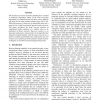Free Online Productivity Tools
i2Speak
i2Symbol
i2OCR
iTex2Img
iWeb2Print
iWeb2Shot
i2Type
iPdf2Split
iPdf2Merge
i2Bopomofo
i2Arabic
i2Style
i2Image
i2PDF
iLatex2Rtf
Sci2ools
ICRA
2003
IEEE
2003
IEEE
On addressing the run-cost variance in randomized motion planners
The decades of research in motion planning have resulted in numerous algorithms. Many of the most successful algorithms are randomized and can have widely differing run-times for the same problem instance from run to run. While this property is known to be undesirable from user’s point of view, it has been largely ignored in past research. This paper introduces the large run-cost variance of randomized motion planners as a distinct issue to be addressed in future research. Run-cost variance is an important performance characteristic of an algorithm that should be studied together with the mean run-cost. As a positive example of possibilities for reducing the run-cost variance of a randomized motion planner, simple heuristic techniques are introduced and investigated empirically.
| Added | 04 Jul 2010 |
| Updated | 04 Jul 2010 |
| Type | Conference |
| Year | 2003 |
| Where | ICRA |
| Authors | Pekka Isto, Martti Mäntylä, Juha O. Tuominen |
Comments (0)

